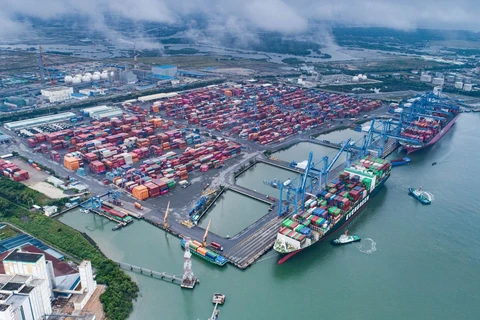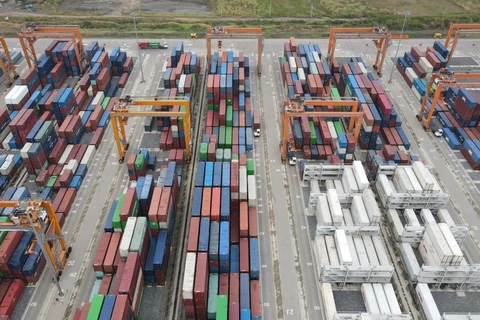 The mega container ship M/V OOCL SPAIN enters the Gemalink port, which is part of the Cai Mep-Thi Vai port complex in Phu My town, Ba Ria-Vung Tau province. (Photo: VNA)
The mega container ship M/V OOCL SPAIN enters the Gemalink port, which is part of the Cai Mep-Thi Vai port complex in Phu My town, Ba Ria-Vung Tau province. (Photo: VNA) Hanoi (VNA) – The development of a free trade zone in Ba Ria-Vung Tau with link to local seaports is expected to provide the southern province with opportunities to increase its attractiveness to foreign investors and to access technical assistance from partners in borderless trade.
In the most common understanding, a free trade zone is a geographical area within a country or a territory where import and export taxes and trade management measures are not applied.
If effectively implemented early, this solution will not only allow Ba Ria-Vung Tau to efficiently utilise its potential and opportunities in the new context but also create a ripple effect for the entire Southeastern region, Director of the Central Institute for Economic Management (CIEM) Tran Thi Hong Minh assessed at a logistics development partnership forum recently organised by the provincial People's Committee and the Vietnam Chamber of Commerce and Industry (VCCI).
To further analyse these benefits, Minh explained that goods from countries and territories, whether they have a free trade agreement with Vietnam or not, can be transported, processed, manufactured, separated, packaged, and processed in the province's free trade zone without import and export taxes. Subsequently, these products can be exported to another country or imported into Vietnam.
In the case of exporting goods from the free trade zone, businesses will avoid or minimise costs (in terms of time, finance, and labour) related to import procedures, re-export, tax payment, and tax refunds. In the context of Ba Ria-Vung Tau being one of the leading centres for attracting foreign direct investment (FDI) and logistics in the country, the establishment and development of a free trade zone will enhance the attractiveness of the province and the entire Southeastern region to foreign investors.
Moreover, the free trade zone in Ba Ria-Vung Tau could serve as a testing ground for implementing digital transformation initiatives and projects related to customs and overall trade management.
"In collaboration with the United Nations Economic and Social Commission for Asia and the Pacific (ESCAP), we have assessed Vietnam's readiness in terms of legal and technical aspects for paperless cross-border trade. If the province boldly pursues this direction, it may also have the chance to access technical assistance from partners," Minh said.
 At the Gemalink international port, the largest deep-water port in the Cai Mep - Thi Vai area (Photo: VNA)(Photo: VNA)
At the Gemalink international port, the largest deep-water port in the Cai Mep - Thi Vai area (Photo: VNA)(Photo: VNA) With these advantages in mind, Minh proposed four measures serving the building of the free trade zone, which can serve as a strategic breakthrough in the locality’s seaport and economic development.
Firstly, it is necessary to determine the location and scale of the zone in line with relevant plans, current conditions, and the regional and interregional directions for developing transport and service connections (including logistics). The provincial authorities should engage in discussions and listen to opinions of investors, particularly foreign ones.
Secondly, a review of economic and trade policies and related policies, including those pertaining to the development of human resource and of utilities (finance, insurance, banking, healthcare, etc.) to support business activities within the zone, is required. Based on this, policies that fall within the province's authority should be identified, while proposals for granting the relevant authorities the power to implement related mechanisms serving the timely and effective operation of the area should be made.
Thirdly, it is necessary to study and make recommendations with regard to the establishment of an efficient organisational model and management structure, which is linked to modern and transparent management principles and methods using specific metrics for the zone’s operations.
Fourthly, a plan to enhance institutional and technical capacity in preparation for the operation of the area should be developed.
During this process, the province can collaborate with relevant ministries and sectors to propose technical support tailored to the needs of local agencies and businesses, Minh suggested./.
























